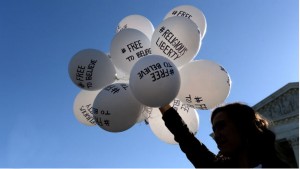Home » Commentary » Opinion » The Weaponising of Victimhood and Grievance
· Quadrant

 A gulf is opening in our society. On one side is the majority, genuinely tolerant of different styles of living and loving. On the other, a ‘progressive’ minority determined to take offence at slights more perceived than real and use the pulpit of outrage to impose a new and intolerant orthodoxy
A gulf is opening in our society. On one side is the majority, genuinely tolerant of different styles of living and loving. On the other, a ‘progressive’ minority determined to take offence at slights more perceived than real and use the pulpit of outrage to impose a new and intolerant orthodoxy
By releasing the report of the Ruddock review, Prime Minister Scott Morrison has finally honoured a solemn promise made by Malcolm Turnbull when Parliament legalised same-sex marriage. The promise was to protect religious freedom, but when Ruddock handed in his report in May, Turnbull did nothing with it. Morrison has now down the right thing by making Ruddock’s recommendations public and pledging to campaign at the next election on a promise to protect religious freedom in Australia.
The release at long last gives the nation an opportunity to engage in a mature and thoughtful way with religious freedom – one of the pressing issues of our day. Australians are not a godless people. Some 60 per cent of us claim a religious affiliation, something missed by those living in the Canberra bubble who have so far failed to resolve the divisive issue of religious freedom.
Part of the problem has been the panic that broke out about the alleged plight of gay students under threat of being kicked out of religious schools. No one has produced any example of such an expulsion. Yet unable to formulate protections that everyone could agree on for the rights of LGBTQI kids, Parliament remained deadlocked over how to legislate for a problem that doesn’t appear even to exist.
No one responsible for faith-based schools wants to harm or hurt students. Christian leaders have clearly and repeatedly stated their commitment to protecting the wellbeing of all students. But their word is not enough: LGBTQI activists are demanding that these assurances are backed up by tougher laws. The question is how to protect vulnerable students while at the same time upholding the right of religious groups to exercise in good faith the freedom to teach their doctrines and live by their ethics. Now the government proposes to adopt a key Ruddock recommendation for a new religious discrimination act. This would protect believers and faith-based organisations by making it unlawful to discriminate on the basis of a person’s religious beliefs.
But this leaves one of the key problems unaddressed. For in order to have genuine religious freedom, a religious organisation needs to have the right to discriminate in order to maintain its ethos and uphold the doctrines by which it lives. In the age of identity politics, however, anti-discrimination laws are being driven to dangerous extremes. Morrison’s answer is to send the problem off to the Human Rights Commission to work up a solution.
These laws were originally intended to act as a check on behaviour society regarded as wrong. It meant, for example, that when making a decision about hiring staff or leasing property, or selling goods, it was unlawful to base that decision on a person’s race, ethnicity, gender, or sexual orientation.
Anti-discrimination laws were not originally concerned with the vulnerability of those so-called ‘protected categories’ — they were concerned with stopping behaviour deemed unfair and demeaning. The law was not changed because anyone thought that people in those categories were weaker, or more fragile, or vulnerable to self-harm; but because our society was changing — and for the better.
But today, anti-discrimination laws have been weaponised. Today, when we talk about discrimination against LGBTQI people, the underlying assumption is that they are weak, fragile, and vulnerable. Once legislators recognised a series of competing rights – egged on by groups such the Australian Greens and Australian Marriage Equality, the very exemptions that afforded religious organisations their distinct identity came under threat. For these lobby groups, the mere existence of religious exemptions is nothing less than an affront to the dignity of LGBTQI people. Weaponised anti-discrimination laws pose an existential threat to faith-based groups.
As the Ruddock Inquiry makes clear, religious freedom is not about protecting religion: it is about protecting a human right which is to be enjoyed by – and inherent to the dignity of – every individual. Of course, it remains to be seen whether the Ruddock recommendations can be turned into law by a Morrison government.
Ruddock presents an important opportunity to strengthen a fundamental freedom which is under threat. We have the choice to live tolerantly and cohesively, and flourish with difference and diversity by protecting the rights of all. Or we can allow the breach in our society over religion to open out into an unbridgeable gulf.
Peter Kurti is a Senior Research Fellow at The Centre for Independent Studies and Adjunct Associate Professor of Law at the University of Notre Dame Australia.
Robert Forsyth is a Senior Fellow at The Centre for Independent Studies and an Anglican bishop.
The Weaponising of Victimhood and Grievance